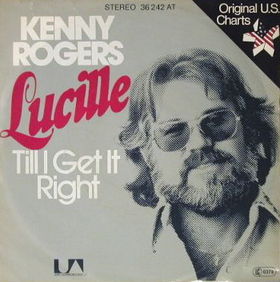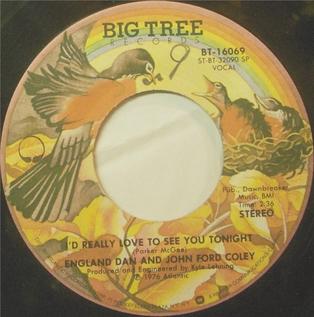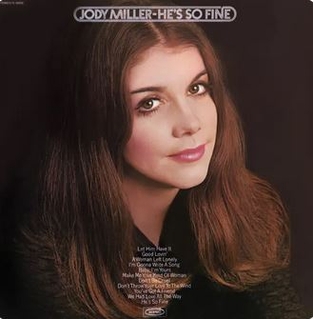Related Research Articles

"Me and Bobby McGee" is a song written by American singer-songwriter Kris Kristofferson and originally performed by Roger Miller. Fred Foster shares the writing credit, as Kristofferson wrote the song based on a suggestion from Foster. A posthumously released version by Janis Joplin topped the U.S. singles chart in 1971, making the song the second posthumously released No. 1 single in U.S. chart history after "(Sittin' On) The Dock of the Bay" by Otis Redding. Gordon Lightfoot released a version that reached number 1 on the Canadian country charts in 1970. Jerry Lee Lewis released a version that was number 1 on the country charts in December 1971/January 1972 as the "B" side of "Would You Take Another Chance On Me." Billboard ranked Joplin's version as the No. 11 song for 1971.

"Baby I Need Your Loving" is a 1964 hit single recorded by the Four Tops for the Motown label. Written and produced by Motown's main production team Holland–Dozier–Holland, the song was the group's first Motown single and their first pop Top 20 hit, making it to number 11 on the US Billboard Hot 100 and number four in Canada in the fall of 1964. It was also their first million-selling hit single.

Robin McNamara was an American musician, singer and songwriter.

Myrna Joy "Jody" Miller was an American singer, who had commercial success in the genres of country, folk and pop. She was the second female artist to win a country music accolade from the Grammy Awards, which came off the success of her 1965 song "Queen of the House". By blending multiple genres together, Miller's music was considered influential for other music artists.

"I'll Never Fall in Love Again" is a popular song by composer Burt Bacharach and lyricist Hal David that was written for the 1968 musical Promises, Promises. Several recordings of the song were released in 1969; the most popular versions were by Dionne Warwick, who took it to number 6 on Billboard magazine's Hot 100 and spent three weeks topping the magazine's list of the most popular Easy Listening songs, and Bobbie Gentry, who topped the UK chart with her recording and also peaked at number 1 in Australia and Ireland, number 3 in South Africa and number 5 in Norway.

"Lucille" is a song written by Roger Bowling and Hal Bynum, and recorded by American country music artist Kenny Rogers. It was released in January 1977 as the second and final single from the album Kenny Rogers. It became Rogers' first major hit as a solo artist after leaving the successful country/rock group the First Edition the previous year. An international hit, it reached number one on the Billboard Country Singles chart and number 5 on the Billboard Hot 100. Overseas, "Lucille" reached the top of the UK Singles Chart in June 1977, the first of Rogers' two number one singles there.

"Paloma Blanca", often called "Una Paloma Blanca", is a song written by Dutch musician George Baker and first recorded and released by his band, George Baker Selection. The single—the title track of the group's fifth album—was released in 1975 with "Dreamboat" as its B-side. The song was a hit throughout Europe, reaching No. 1 in Austria, Finland, Flanders, Germany, the Netherlands, Sweden and Switzerland, and it also topped the charts of New Zealand and South Africa.

"I'd Really Love to See You Tonight" is a song written by Parker McGee and recorded by England Dan & John Ford Coley from their 1976 album Nights Are Forever. It eventually peaked at No. 2 on the Billboard Hot 100 chart for two weeks, behind Wild Cherry's "Play That Funky Music" and No. 1 on the Easy Listening chart. Billboard ranked it as the No. 21 song for 1976. It also reached No. 26 on the UK Singles Chart.

"If You Love Me (Let Me Know)" is a song written by John Rostill that was a 1974 hit single for Olivia Newton-John. It was her second release to hit the top 10 in the United States, reaching number 5 on the pop chart and number 2 on the Easy Listening chart. It also reached number 2 on the Billboard country chart. As with her single "Let Me Be There", Mike Sammes sings a bass harmony. It was nominated for the 1974 Country Music Association Award for Single of the Year.

"My Baby Loves Lovin'" was first released by the British pop group White Plains. The song was written and produced by Roger Cook and Roger Greenaway, recorded on 26 October 1969, and released on 2 January 1970 on the Decca Records imprint, Deram Records. It is a world-wide chart success and the top selling single for White Plains.
If You Ain't Lovin' " is a song written by Tommy Collins and originally recorded by country music artist Faron Young.
"Lovin' Her Was Easier " is a song written, composed, first recorded, and first released by Kris Kristofferson. It was also recorded and released by Roger Miller, who included it on his album The Best of Roger Miller and released it as a single in July 1971. Ten years later, it was recorded by Tompall & the Glaser Brothers for the album Lovin' Her Was Easier.
"This Night Won't Last Forever" is a song written by Bill LaBounty and Roy Freeland, and originally recorded by LaBounty in 1978, whose version of the song was a minor Adult Contemporary and pop hit, reaching number 65 on the Billboard Hot 100.

"Sweet Music Man" is a song written and recorded by American musician Kenny Rogers. It appears on his 1977 album Daytime Friends, from which it was released as the final single.
"Dream On" is a song written by Dennis Lambert and Brian Potter. In 1974, The Righteous Brothers had a hit version, reaching No. 32 on the Billboard Hot 100, and No. 6 on the U.S. and Canadian Adult Contemporary charts. Bill Medley and Bobby Hatfield alternate lead vocals.

The following is a detailed discography of all singles released by American singer-songwriter Willie Nelson. A total of 25 Nelson singles have reached number one on music charts in the US.

The singles discography of Connie Smith, an American country artist, consists of 48 singles, one music video and one additional charting song. After signing with RCA Victor Records in 1964, Smith released her debut single in August entitled "Once a Day". The song topped the Billboard Magazine Hot Country Singles chart by November and held the position for eight weeks, to date being the longest running song at number one by a female country artist. The single's success launched Smith into stardom, making Smith one of the decade's most successful female artists. The follow-up single "Then and Only Then" reached #4 on the country singles chart, while its flip side went to #25 on the same chart. All of Smith's singles released between 1965 and 1968 reached the top 10 on the Billboard country songs chart, including "If I Talk to Him", "Ain't Had No Lovin'", and "Cincinnati, Ohio". By 1969 Smith felt highly pressured from her career and cut back on promoting singles. Smith's chart success slightly declined because of this, with songs like "Ribbon of Darkness" (1969) and "Louisiana Man" (1970) only reaching the top 20. Other singles continued to peak within the top 10 including "I Never Once Stopped Loving You" (1970) and "Just One Time" (1971).

The discography of American singer Jody Miller contains 21 studio albums, five compilation albums, one video album, one album appearance, one extended play (EP) and 57 singles. Of her 57 singles, 47 were issued with Miller as the lead artist, two were released as a collaboration, two were promotional singles and five were internationally-released singles.

Long Hard Climb is the fourth studio album by Australian-American pop singer Helen Reddy, released on July 23, 1973, by Capitol Records and, aside from its primary focus on Top 40-friendly material, had her trying out New Orleans jazz and the English-language version of a recent Charles Aznavour standard. It debuted on Billboard's Top LP's & Tapes chart in the issue dated August 11, 1973, and reached number eight during its 43 weeks there, and in Canada's RPM magazine it peaked at number 14. On September 19 of that year, the Recording Industry Association of America awarded the album with Gold certification for sales of 500,000 copies in the United States. On July 22, 2003, it was released for the first time on compact disc as one of two albums on one CD, the other album being her 1972 release I Am Woman.

He's So Fine is a studio album by American singer Jody Miller. It was released in August 1971 via Epic Records and contained 11 tracks. A majority of the album's material were covers of country and pop songs. Two of its covers were originally released as singles: the title track and "Baby I'm Yours". Both reached the top ten of the North American country charts and reaches other chart positions. The album itself reached the top 20 of the American country chart in 1971.
References
- ↑ Whitburn, Joel (2004). The Billboard Book of Top 40 Hits: Eighth Edition. Record Research. p. 592.
- ↑ "RPM Top 100 Singles - August 15, 1970" (PDF).
- ↑ "RPM Top 100 Singles of the Year - January 9, 1971" (PDF).
- ↑ Kent, David (1993). Australian Chart Book 1970–1992 (illustrated ed.). St Ives, N.S.W.: Australian Chart Book. p. 187. ISBN 0-646-11917-6.
- ↑ "RPM Top 100 Singles - October 31, 1970" (PDF).
- ↑ Whitburn, Joel (2008). Hot Country Songs 1944 to 2008. Record Research, Inc. p. 277. ISBN 978-0-89820-177-2.